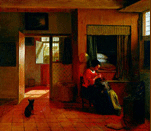










34.
Early Modern English Women's Letters:
Perspectives on Interdisciplinary Teaching
Organizers:
Description:
The aim of this informal workshop is to explore a range of pedagogical approaches
towards using women's letters in courses on women's studies, early modern
literature and history, and interdisciplinary studies. As researchers in the
field of women¹s letter-writing, we would like to offer a framework for
discussing the issues arising from studying letters as literary texts and
as historical documents, as well as to provide useful teaching techniques
and to make accessible materials that can be employed in the classroom.
We have taught a range of undergraduate and graduate courses in England, Canada, and the United States that either focus on or draw upon letters. For the first part of our workshop (no more than 20 minutes), we propose to introduce our classroom experiences as a way of illustrating the richness, diversity and versatility of women¹s letters in interrogating a range of problems peculiar to the English early modern period.
For example, Sara Jayne Steen regularly teaches an upper-division undergraduate course on Sixteenth- and Seventeenth-Century British Literature that focuses on the concept of identity and the self, exploring female as well as male subjectivities. Issues that students confront (and which we might treat in the subsequent discussion) include the following: what do students need to know in order to work successfully with a genre that is unfamiliar to them? What social conventions or assumptions might we as readers not share with early modern readers and writers? What material aspects of letters carry meaning? What does it mean to understand subjectivity when, as is usual, one does not have both sides of the correspondence? How does one read letters sequentially, and what effect does sequence have on one's sense of the writer and her story?
Lynne Magnusson teaches a graduate course on “The Language of Letters,” which draws on epistolary rhetoric and discourse pragmatics to develop strategies for analyzing the social rhetoric of letters (and, by extension, of other historical documents). Do letters offer a productive point of entry into early modern women’s language? Does attention to linguistic forms help to illuminate historically specific social relations or female subjectivity? Given the dialogic nature of correspondence, how does reception help to shape women’s writing? Are the conventional scripts and the exaggerated courtesies of suitors’ letters, business letters, or even family correspondence a barrier or resource for women’s self-expression?
The workshop will encourage interdisciplinary approaches in teaching about the lives and experiences of early modern women, rather than setting up a binary of letters as historical documents versus letters as literature (though this forms an interesting point of discussion for students). In order to achieve this interdisciplinary aim, participants will have read a selection of women’s letters (including manuscript facsimiles) and brief extracts from Renaissance epistolary manuals such as those by Erasmus and Angel Day. These primary texts may be supplemented by recent critical work that has challenged the ways in which we read, think about and understand early modern letters and letter-writing practices: the work of Roger Chartier and his colleagues on the popular impact of supposedly elite models of letter-writing; Jonathan Goldberg’s study of the politics of writing matter; the complex nature of manuscript circulation examined by Arthur Marotti, Henry Woudhuysen and Harold Love; Lisa Jardine’s illumination of the ways in which familiar epistles were used in the construction of charisma in print; Lynne Magnusson’s exploration of the ways in which letters might have scripted social interaction; Jonathan Gibson and Alan Stewart on the materiality of the Renaissance letter; and the work of Alan Stewart (Francis Bacon), Sara Jayne Steen (Arbella Stuart), Heather Wolfe (Elizabeth Cary), and Margaret Hannay (Mary Sidney) on editing letters. Some materials (no more than 30 minutes) will be mailed to participants in advance or be available via the web, and a bibliography of suggested readings above will be available electronically.
All three conveners have published books on women's letters or letter-writing. James Daybell is the editor of Early Modern Women's Letter-Writing, 1450-1700 (Palgrave, 2001) and is completing a book on women letter writers in Tudor England (to appear from Oxford UP). Lynne Magnusson is the author of Shakespeare and Social Dialogue: Dramatic Language and Elizabethan Letters (Cambridge UP, 1999) and is completing a book on the language of Elizabethan women’s letters. Sara Jayne Steen is the editor of The Letters of Lady Arbella Stuart (Oxford UP, 1994) and is working on a book on seventeenth-century women writers that includes two chapters on women letter-writers.
|
|
|
||||||
|
|
 |
 |
|
||||
 |
|
 |
|
||||
|
|
|
||||||
|
|
|
||||||
 |
|
||||||
|
|
|
||||||
| |
|
||||||
 |
|
||||||
 |
|
||||||
 |
|
||||||
 |
|
||||||
|
|
|
||||||
|
|
 |
|
|
||||
 |
|
||||||
|
|
|
|
|
|
|
|
|